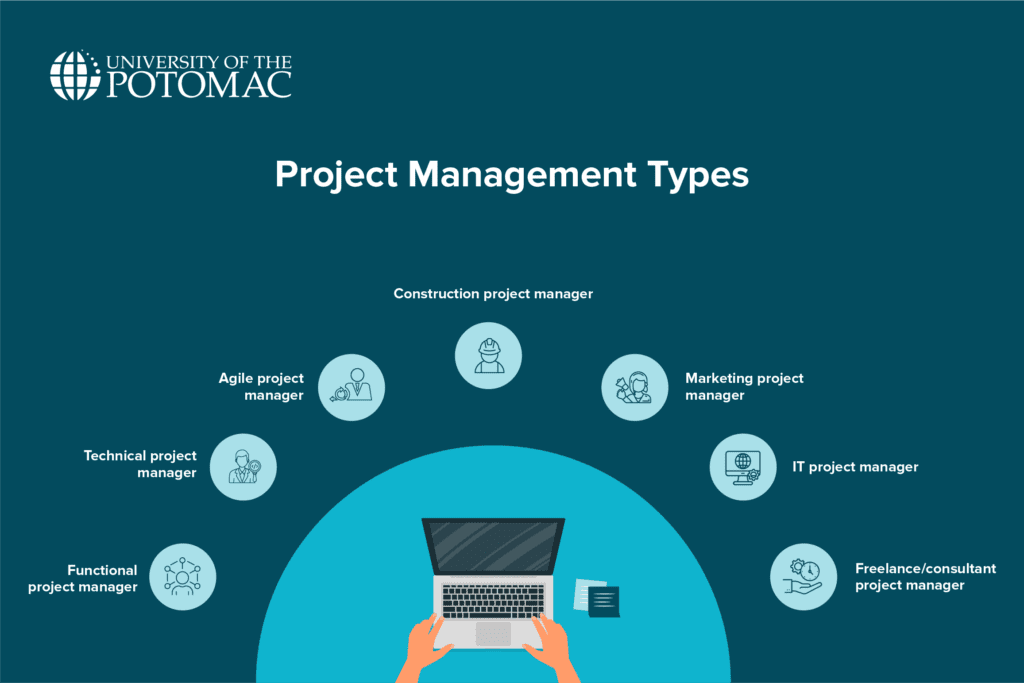Key Takeaways
- There are several types of project managers, including functional, technical, Agile, construction, marketing, IT, and freelance roles.
- Each type has unique responsibilities, work environments, and required skills. Some focus on structure and control, while others thrive on flexibility and teamwork.
- Exploring different industries, tools, and certifications can help you discover the project management path that fits you best.
A project manager is the person who keeps everything running smoothly when a team works toward a shared goal. They plan, organize, and guide a project from beginning to end, making sure deadlines are met, budgets stay on track, and communication flows clearly.
But not all project managers are the same. The work they do can vary a lot depending on the industry, the size of the team, or the complexity of the project. That’s why there are different types of project managers, each with their own approach and area of expertise. Understanding these differences helps match the right person to the right project.
Types of Project Managers
Project management comes in many forms, each suited to a unique environment. You’ll find technical, construction, marketing, IT, and agile project managers, all playing distinct roles across industries.

Functional project manager
A functional project manager keeps things running smoothly within one department, like HR, finance, or marketing. They’re the ones who make sure internal projects stay organized, people have what they need, and resources are used wisely.
Think of them as the go-to person when a department wants to improve how it works. Maybe HR is rolling out a new hiring system, or finance is updating its reporting tools; this project manager keeps it all on track.
Their focus stays close to home, helping their team avoid burnout, fixing workflow issues, and finding better ways to get things done. Since they’re deeply involved with one team, they really understand its strengths and challenges.
Technical project manager
A technical project manager is part leader, part tech expert. They don’t just understand the big picture, but they also speak the same language as software developers, engineers, or IT specialists. Their job is to make sure projects with lots of technical details run smoothly, stay on schedule, and actually deliver what they’re supposed to.
Let’s say a company is launching a new app or rolling out a major software update. The technical project manager makes sure the developers stay on task, the client knows what’s going on, and nothing slips through the cracks. They often use tools like Jira, Confluence, or Trello to track progress.
What makes them special is their ability to explain technical stuff to non-tech folks and vice versa. In the United States, professionals in this position earn an average annual salary of approximately $117,000 per year, reflecting the high demand for individuals who can bridge leadership and technical expertise.
Agile project manager
An agile project manager helps teams move fast without falling apart. They work in environments where things change quickly, like tech companies, startups, or digital agencies. Instead of long, slow project timelines, they guide teams through short, focused bursts of work called sprints.
Their job is to keep the team talking, improving, and adapting. They run daily check-ins, help clear roadblocks, and make sure everyone stays aligned on what really matters. It’s less about giving orders and more about helping teams work better together.
This approach requires flexibility, people skills, and a whole lot of patience. Agile PMs also often use tools like Kanban boards or Scrum boards to keep things visual and transparent. And it pays well, too. The average agile project manager in the U.S. earns around $118,000 per year, making it a great role for those who love fast-paced, team-driven work.
Construction project manager
A construction project manager is the person who brings blueprints to life. They’re in charge of everything happening on a construction site, from digging the first hole to finishing the last coat of paint. It’s a big job that involves working with architects, contractors, city inspectors, and the client who’s footing the bill.
These experts ensure that everyone arrives on time, that safety regulations are observed, and that the budget doesn’t get out of control. Additionally, they closely monitor building codes and permits to ensure that every aspect of the job is completed correctly.
This role calls for strong organization, clear communication, and a bit of grit. It’s perfect for someone who likes being on-site and seeing real-world results. In the U.S., construction project managers earn around $97,000 per year, which is solid pay for a job that’s as hands-on as it gets.

Marketing project manager
A marketing project manager is the person who keeps campaigns running smoothly behind the scenes. Whether it’s launching a new product, planning a brand refresh, or rolling out a big ad campaign, they’re the ones juggling timelines, creative teams, and client expectations. They make sure copywriters, designers, social media managers, and outside vendors all stay on the same page and hit the deadline.
These project managers are organized, creative, and tech-savvy. They often use tools like Asana, Trello, or HubSpot to keep everything moving. They’re also great at communicating with stakeholders and making sure the brand voice stays consistent throughout.
It’s a fast-paced role, but one with a lot of variety and creativity. Salaries vary based on company size, but in the U.S., they usually earn $91,000 on average per year. It’s a great fit for someone who loves both strategy and storytelling.
IT project manager
An IT project manager handles the tech projects that keep businesses running, such as setting up new systems, rolling out software, or upgrading networks. They’re the ones who map out how a system change will happen, make sure the right tech partners are on board, and guide the team through every phase.
IT project managers deal with risks, budget plans, and vendor contracts while making sure everything works well with the company’s existing systems. Integration is key here; nothing can break while something new is being added. Certifications like PMP, ITIL, or Scrum often come in handy, especially in larger or more complex environments.
Interested in pursuing a degree?
Fill out the form and get all admission information you need regarding your chosen program.
This will only take a moment.
Message Received!
Thank you for reaching out to us. We will review your message and get right back to you within 24 hours.
If there is an urgent matter and you need to speak to someone immediately you can call at the following phone number:
- We value your privacy.
These professionals must be able to speak both business and technical languages because they frequently collaborate with executives and technical teams. With all that responsibility, it’s no surprise that salaries often sit around $100,000 to $120,000 per year in the U.S., with an average of $113,000, making this a smart path for those with a mind for tech and detail.
Freelance/consultant project manager
A freelance or consultant project manager brings their skills to companies on a short-term or contract basis. They jump into a project, quickly figure out what needs to be done, and help guide things to the finish line. Some work with startups that need a part-time manager; others support big companies during peak seasons or special launches.
Because they’re not tied to one company, these project managers need to be flexible, independent, and quick to adapt. They might work across different industries, using tools and strategies that fit each client’s needs. Often, their job is just as much about advising and troubleshooting as it is about managing timelines.
More companies are hiring project managers this way, especially as remote work grows and teams need support without long-term commitments. Pay varies widely, but experienced freelance PMs can earn solid rates, sometimes $50 to $100 an hour or more, depending on the project and industry. On a yearly basis, they average $96,000.
How to Identify Your Ideal Project Management Role
Finding the right path within the scope of project management starts with looking at what you already know. If you’ve worked in marketing, construction, or IT, you’re already one step ahead. That experience gives you insider knowledge, which makes managing projects in that field feel more natural and rewarding.

It also helps to think about how you like to work. Do you enjoy working closely with a team, adapting quickly, and keeping things flexible? You might feel at home in Agile environments. Prefer setting a clear plan, calling the shots, and sticking to timelines? A more traditional project management role could be a better match.
Not sure yet? Try getting hands-on. A few simple steps can help you figure it out:
- Volunteer to help manage a project at work or with a local group.
- Take a beginner-friendly Agile or PMP course.
- Shadow a project manager in your current company.
- Experiment with tools like Trello, Asana, or Monday.com.
You can get a better sense of what feels right by experimenting with various tools and styles. Every PM position has a unique rhythm, and once you discover yours, the work becomes much more impactful and pleasurable.
Conclusion
Project management comes in many forms, each with its own style and focus, whether it’s leading creative campaigns, managing tech rollouts, or keeping construction sites on track. The key is finding a role that fits your interests, skills, and work style.
At University of the Potomac, you can build a strong foundation through the Bachelor of Science in Information Technology program, which includes essential project management training. If you’re ready to take the first step toward a rewarding and flexible career in project management, Potomac offers the tools, support, and real-world knowledge to help you get there with confidence.
Frequently Asked Questions
Can you switch between different types of project management roles?
Yes, many skills transfer across roles, so switching is possible with some industry knowledge or additional training.
How long does it take to become a project manager?
It can take anywhere from a few months to a few years, depending on your background, experience, and whether you pursue certifications or a degree.









